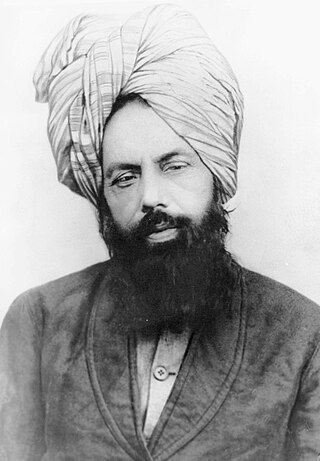
Mirza Ghulam Ahmad was an Indian religious leader and the founder of the Ahmadiyya movement in Islam. He claimed to have been divinely appointed as the promised Messiah and Mahdī—which is the metaphorical second-coming of Jesus (mathīl-iʿIsā), in fulfillment of the Islamic prophecies regarding the end times, as well as the Mujaddid of the 14th Islamic century.

Sir Syed Ahmad Khan, also spelled Sayyid Ahmad Khan, was an Indian Muslim reformer, philosopher, and educationist in nineteenth-century British India.

Ahmadiyya considers Jesus (ʿĪsā) as a mortal man, entirely human, and a prophet of God born to the Virgin Mary (Maryam). Jesus is understood to have survived the crucifixion based on the account of the canonical Gospels, the Qurʾān, hadith literature, and revelations to Mirza Ghulam Ahmad. Having delivered his message to the Israelites in Judea, Jesus is understood to have emigrated eastward to escape persecution from Judea and to have further spread his message to the Lost Tribes of Israel. In Ahmadiyya Islam, Jesus is thought to have died a natural death in India. Jesus lived to old age and later died in Srinagar, Kashmir, and his tomb is presently located at the Roza Bal shrine.

The Lahore Ahmadiyya Movement for the Propagation of Islam, is a separatist group within the Ahmadiyya movement that formed in 1914 as a result of ideological and administrative differences following the demise of Hakim Nur-ud-Din, the first Caliph after Mirza Ghulam Ahmad. Members of the Lahore Ahmadiyya movement are referred to by the majority group as ghayr mubāyi'īn and are also known colloquially as Lahori Ahmadis.

Islamic schools and branches have different understandings of Islam. There are many different sects or denominations, schools of Islamic jurisprudence, and schools of Islamic theology, or ʿaqīdah (creed). Within Islamic groups themselves there may be differences, such as different orders (tariqa) within Sufism, and within Sunnī Islam different schools of theology and jurisprudence. Groups in Islam may be numerous, or relatively small in size.
Bias in curricula refers to real or perceived bias in educational textbooks.
Mufti Ghulam Rasool Jamaati was a Sunni Hanafi Islamic scholar. He is accepted by his followers as the Grand Mufti of Great Britain.

Mirza Basheer-ud-Din Mahmood Ahmad was the second caliph, leader of the worldwide Ahmadiyya Muslim Community and the eldest son of Mirza Ghulam Ahmad from his second wife, Nusrat Jahan Begum. He was elected as the second successor of Mirza Ghulam Ahmad on 14 March 1914 at the age of 25, the day after the death of his predecessor Hakim Nur-ud-Din.
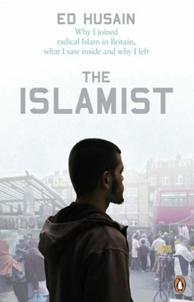
The Islamist: Why I Joined Radical Islam in Britain, What I Saw Inside and Why I Left is a 2007 book about Ed Husain's five years as an Islamist. The book has been described as "as much a memoir of personal struggle and inner growth as it is a report on a new type of extremism." Husain describes his book as explaining "the appeal of extremist thought, how fanatics penetrate Muslim communities and the truth behind their agenda of subverting the West and moderate Islam."

Muslim Educational Trust (MET) is an educational organization offering information, advice and publications about education and the educational needs of children to parents in particular. It is based in London.
Ghulam Sarwar is a Bangladeshi-born British writer on Islam in English and director of the Muslim Educational Trust (MET).
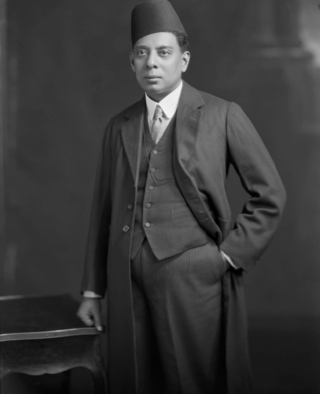
Sir Abdullah al-Mamun Suhrawardy was a Bengali Islamic scholar, barrister, and academic. He was the Tagore Law Lecturer in 1911 and involved in notable educational work. Abdullah was the first Indian to attain a PhD degree in English from Calcutta University
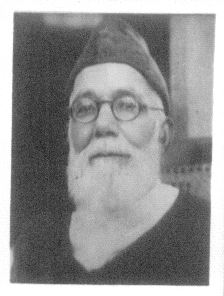
Chaudhry Niaz Ali Khan was a civil engineer, agriculturalist, and philanthropist who founded "Dar ul Islam Movement" and "Dar ul Islam Trust" in South Asia and "Dar ul Islam Trust" Institutes in Pathankot and Jauharabad. Besides a philanthropist, Niaz was also a civil servant, and a landowner. He was the member of All-India Muslim League and a participant of the Pakistan Movement with the ultimate aim of creating the Muslim-majority areas of British India.

Ahmadiyya, officially the Ahmadiyya Muslim Jama'at (AMJ) is an Islamic messianic movement originating in British India in the late 19th century. It was founded by Mirza Ghulam Ahmad (1835–1908), who said he had been divinely appointed as both the Promised Mahdi and Messiah expected by Muslims to appear towards the end times and bring about, by peaceful means, the final triumph of Islam; as well as to embody, in this capacity, the expected eschatological figure of other major religious traditions. Adherents of the Ahmadiyya—a term adopted expressly in reference to Muhammad's alternative name Aḥmad—are known as Ahmadi Muslims or simply Ahmadis.
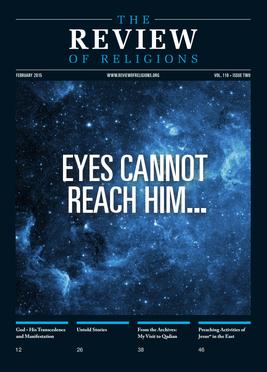
The Review of Religions is an English-language comparative religious magazine published monthly by the Ahmadiyya Muslim Community. Regularly in print since 1902, it is one of the longest running Islamic periodicals in English. It has been described as the main publication of the Ahmadiyya movement in the language and as a valuable source material for information on the geographical expansion of Ahmadi activity. The magazine was launched by Mirza Ghulam Ahmad with the aim of conveying an accurate understanding of Islamic teachings across the English-speaking world and dispelling misconceptions held against the faith. The articles, however, typically comprise distinctly Ahmadi perspectives. In addition to the English edition published from London, the magazine currently publishes separate quarterly editions in German, French and Spanish.
The Pakistani textbooks controversy refers to claimed inaccuracies and historical denialism. The inaccuracies and myths promote religious intolerance and Indophobia and lead to calls for curriculum reform. According to the Sustainable Development Policy Institute, Pakistan's school textbooks have systematically inculcated anti-Indian discrimination through historical omissions and deliberate misinformation since the 1970s.
Ghulam-Sarwar Yousof was a Malaysian academic and writer. He was an expert in traditional Malay and South-East Asian theatre as well as one of the leading writers of Malaysian English Literature.
Ghulam Muhammad Khan Bhurgri (Barrister),(1878-1924) was a Sindhi statesman.
Islam is an Abrahamic, monotheistic religion. Muslims are those who adhere to that religion. Islam may also refer to:
Aisha Lemu, MON was a British-born author and religious educator who converted to Islam in 1961 and lived most of her life in Nigeria.